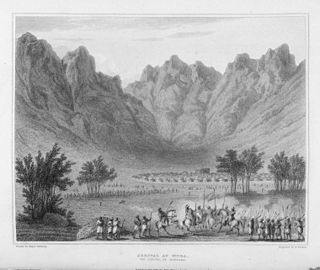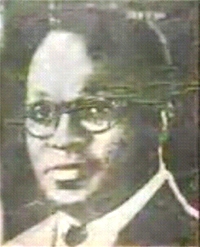This is a list of heads of government of British Cameroons
| Tenure | Incumbent | Affiliation | Notes |
|---|---|---|---|
| 1 October 1954 to 1 February 1959 | E. M. L. Endeley , Premier | ||
| 1 February 1959 to 1 October 1961 | John Ngu Foncha , Premier | KDNP |
This is a list of heads of government of British Cameroons
| Tenure | Incumbent | Affiliation | Notes |
|---|---|---|---|
| 1 October 1954 to 1 February 1959 | E. M. L. Endeley , Premier | ||
| 1 February 1959 to 1 October 1961 | John Ngu Foncha , Premier | KDNP |
| KNDP | Kamerun National Democratic Party British Cameroon-based |
At the crossroads of West Africa and Central Africa, the territory of what is now Cameroon has seen human habitation since some time in the Middle Paleolithic, likely no later than 130,000 years ago. The earliest discovered archaeological evidence of humans dates from around 30,000 years ago at Shum Laka. The Bamenda highlands in western Cameroon near the border with Nigeria are the most likely origin for the Bantu peoples, whose language and culture came to dominate most of central and southern Africa between 1000 BCE and 1000 CE.

British Cameroon or the British Cameroons was a British mandate territory in British West Africa, formed of the Northern and Southern Cameroons. Today, the Northern Cameroons forms parts of the Borno, Adamawa and Taraba states of Nigeria, while the Southern Cameroons is a part of the Republic of Cameroon.

Paul Biya is a Cameroonian politician who has served as the president of Cameroon since 6 November 1982. He is the second-longest-ruling president in Africa and the oldest head of state in the world.

Ahmadou Babatoura Ahidjo was a Cameroonian politician who was the first President of Cameroon, holding the office from 1960 until 1982. Ahidjo played a major role in Cameroon's independence from France as well as reuniting the French and English-speaking parts of the country. During Ahidjo's time in office, he established a centralized political system. Ahidjo established a single-party state under the Cameroon National Union (CNU) in 1966. In 1972, Ahidjo abolished the federation in favor of a unitary state.

The coat of arms of Cameroon consists of a shield with a banner above and below it. Behind the shield are two crossed fasces. The shield has the same color pattern as the flag of Cameroon, and in the center is a map of the nation. The scales of justice are superimposed on top of the map of the nation since 1998.

The Northwest Region, or North-West Region is one of ten regions in Cameroon. Its regional capital is Bamenda. The Northwest Region was part of the Southern Cameroons, found in the western highlands of Cameroon. It is bordered to the southwest by the Southwest Region, to the south by the West Region, to the east by the Adamawa Region, and to the north by Nigeria. Various Ambazonian nationalist and separatist factions regard the region as being distinct as a polity from Cameroon.

Ambazonia, officially the Federal Republic of Ambazonia, also referred to as Amba Land, is an unrecognised breakaway state in West Africa constituting the Northwest Region and Southwest Region of Cameroon, part of the British mandate territory historically known as the Southern Cameroons. No country has formally recognized Ambazonia's independence, and it is currently the site of an armed conflict between Ambazonian separatists and the Cameroonian military known as the Anglophone Crisis. Ambazonia is located in the west of Cameroon and southeast of Nigeria on the Gulf of Guinea.
Articles related to Cameroon include:

The Southern Cameroons was the southern part of the British League of Nations mandate territory of the British Cameroons in West Africa. Since 1961, it has been part of the Republic of Cameroon, where it makes up the Northwest Region and Southwest Region. Since 1994, pressure groups in the territory claim there was no legal document in accordance to UNGA RES 1608(XV) paragraph 5, and are seeking to restore statehood and independence from the Republic. They renamed the British Southern Cameroons as Ambazonia.

The Mandara Kingdom was an African kingdom in the Mandara Mountains of what is today Cameroon. The Mandara people are descended from the kingdom's inhabitants.

Andre-Marie Mbida was a Cameroonian statesman, a nationalist, the first Cameroonian to be elected Member of Parliament at the French National Assembly, a Prime Minister of Cameroon, the second African-born Prime Minister in Sub-Saharan Africa, the first Head of State of French-speaking autonomous Cameroon from 12 May 1957 to 16 February 1958, and the first political prisoner of independent Cameroon from 29 June 1962 to 29 June 1965.

Postage stamps have been used in Cameroon or Cameroun since the nineteenth century.

French Cameroon or French Cameroons was a French mandate territory in Central Africa. It now forms part of the independent country of Cameroon.

Castor Osendé Afana was a Marxist economist and militant nationalist who died in 1966 while fighting as a guerrilla against the government of Cameroon.
Augustine Ngom Jua was the prime minister of the state of West Cameroon in the Federal Republic of Cameroon from 13 May 1965 to 11 January 1968.
The Anglophone problem, as it is commonly referred to in Cameroon, is a socio-political issue rooted in Cameroon's colonial legacies from the Germans, British, and the French.
Alexandre Douala Manga Bell was head of the Duala people in Cameroon, German officer and French politician.

Cameroonian nationality law is regulated by the Constitution of Cameroon, as amended; the Nationality Code of Cameroon, and its revisions; and various international agreements to which the country is a signatory. These laws determine who is, or is eligible to be, a national of Cameroon. The legal means to acquire nationality, formal legal membership in a nation, differ from the domestic relationship of rights and obligations between a national and the nation, known as citizenship. Cameroonian nationality is typically obtained under the principle of jus sanguinis, i.e. by birth in Cameroon or abroad to parents with Cameroonian nationality. It can be granted to persons with an affiliation to the country, or to a permanent resident who has lived in the country for a given period of time through naturalization.